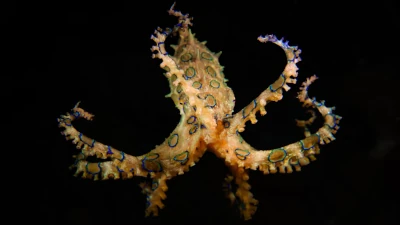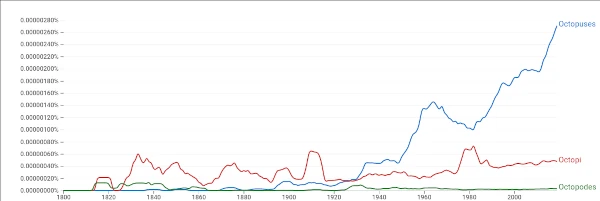English plurals can make your head spin. There are so many ways to form the plural in English that it can get confusing for native and non-native speakers alike. The various plural forms of English come to us through many different avenues. The plural for octopus is no different. Today, let’s explore the fascinating history of the word “octopus” and its many plural forms.
The correct plural of octopus is octopuses. The forms “octopi” and “octopodes” have been reanalyzed forms created by others due to the word’s history as a Greek (and Latin) loan word. However, loan words in English almost always receive the regular plural ending.
Table of Contents
The Many Plurals of Octopus.
Octopus is unique among English words because it has multiple competing plural forms. The word “octopus” has had a wild ride into the English language. Originally, the word comes from ancient Greek “ὀκτώπους” (/oktṓpous/). It is a blend of the ancient Greek words for “eight” and “foot”. No surprises there! Latin, a language spoken by the ancient Romans, was a contemporary with ancient Greek. The two civilizations had a lot of shared contact with each other. As we know, civilizations with contact share words. At some point, the word for these squishy, eight-armed (legged?) animals found its way into Latin as “octōpūs”.
Latin has had a very close relationship with the English language. First through the Roman empire itself. Originally, the southern portion of the British isles was a Roman province called “Britannia”. Naturally, as a Roman province, the inhabitants of it spoke Latin as a lingua franca (a language spoken among different groups of people as a common language for communication). This close contact with the Latin language brought words into the various languages of the Germanic peoples who lived in Europe at the time. (remember, contact means borrowing!)
This was all before English was even a language. It wasn’t until around the middle of the 6th century that English can be found in the historical record. The western Roman empire stopped existing in the latter half of the 5th century. During this period of contact before the collapse, the Germanic languages of the time borrowed many common words that make it to us in modern English. Such as, camp, butter, devil, pillow, cook, wine, street, fork, and many others.

In the 6th and 7th centuries, we find Latin influencing English directly. This time through the Christian church. At the time, Christianity was a dominant force in Europe. The lingua franca of the church happened to be Latin due to the influence of the Roman empire on the development of Christianity. During this time, we received many words too. They weren’t widespread among the general population, however. They were usually literally words used by the educated in the church.
Next Latin influenced English through one of its daughter languages, French, when the Anglo-Saxons (old English speakers!) were conquered in 1066 by the Normans (ancestors to modern day French people who spoke an old dialect of French). During the Norman occupation of Britain, thousands of French words were borrowed into English.
Ever since, Latin has had an immense impact on the English language. This has mostly been through the fields of science and technology. Latin continued to be a lingua franca in Europe throughout the renaissance and into the early industrial evolution. During this time, all educated people could speak, read, and write Latin. This widespread bilingualism lead to further borrowing of Latin words into English.
Throughout the hundreds of years in which English has had contact with Latin, the word “octopus” has been borrowed into English through Latin at some point. So, even though the word “octopus” is originally ancient Greek, English has received the word through Latin! This crazy historical journey has lead to the many competing forms for the plural of octopus we have today. Let’s explore these plurals in more depth.
Latin Plurals
In order to understand where “octopi” comes from, we need to talk a little bit about Latin grammar. By the end of this discussion, you’ll be glad you’re learning English instead of Latin!
Latin is a highly inflected language. This means that the words in Latin change forms often. If you know any European languages, you’ll be familiar with this concept. Many European languages have words that change forms depending on their grammatical category. When nouns (like octōpūs) undergo a form change, this is called declining the noun. Latin has five noun declensions. Each one has twelve different forms. For example, the Latin words “oculus” (eye) declines like this.
| Case | Oculus (eye) Singular | Oculus (eye) Plural |
|---|---|---|
| Nominative | oculus | oculi |
| Genitive | oculi | oculorum |
| Dative | oculo | oculis |
| Accusative | oculum | oculos |
| Ablative | oculo | oculis |
| Vocative | ocule | oculi |
This is only one declension table! There are four more with 12 more forms each! Latin is full of exceptions and irregularities just like any other language too. Aren’t you glad you’re not learning Latin now?
Latin Plural of Octopus
If you’re perceptive, you will have noticed that the plural form of “oculus” is “oculi”. In Latin, some (not all) words that end in -us have an -i in the nominative plural form. This -us looks awfully close to the one in octopus, doesn’t it?
Other English speakers thought so too. So, the plural form “octopi” was initially very popular in English. In the 19th and early 20th centuries, octopi was the preferred plural for the word “octopus”. Makes sense, right? Latin words ending in -us have plural -i forms. Wrong. It may surprise you to find out, but in Latin, “octōpūs” has a completely different plural form because it is in a separate declension pattern!
| Case | Octōpūs Singular | Octōpūs Plural |
|---|---|---|
| Nominative | octōpūs | octōpodēs |
| Genitive | octōpodis | octōpodum |
| Dative | octōpodī | octōpodibus |
| Accusative | octōpodem | octōpodēs |
| Ablative | octōpode | octōpodibus |
| Vocative | octōpūs | octōpodēs |
So, if the whole reason for the plural form “octopi” was due to Latin grammar. That theory is thrown out the window! Not only is the word “octopus” not Latin. It doesn’t even have that plural form in Latin itself! Not even the Romans thought the plural of octopus was octopi. This phenomenon, where speakers “correct” a word into being ungrammatical is called hypercorrection. This is the same thing that happens when someone says “you and I” instead of “you and me”, even when the latter is the correct thing to say.
Greek Plural of Octopus
This brings us to an even more obscure plural of octopus. Actually, it’s a completely different word altogether. That word is “octopod” or “octopode”. This word was cooked up by academics and intellectuals who had a good grasp on ancient Greek and Latin, but not on the speech habits of regular people. As a 148 year old news article tells us, some educated speakers in the 19th century got hot under the collar over the widespread use of “octopi” as a plural of octopus.
But as the Octopus grew and multiplied, it became necessary to speak of him in the plural; and here a whole host of difficulties arose. Some daring spirits with little Latin and less Greek, rushed upon octopi; as for octopuses, a man would as soon think of swallowing one of the animals thus described as pronounce such a word at a respectable tea-table. In this condition of affairs, we are glad to know that a few resolute people have begun to talk about Octopods, which is, of course, the nearest English approach to the proper plural.
— The Bradford Observer (West Yorkshire, Eng.), 7 Nov. 1873 (courtesy of Merriam Webster)
As we can see from the above, they liked “octopuses” even less. Which is no surprise. The 19th century in England was known as the “Victorian era”. This era of British history is known for its extreme modesty and aversion to vulgarity in all respects. The plural “octopuses” sounds vaguely vulgar. Doesn’t it?
This plural of octopus didn’t really catch on, however. There was a brief spike of popularity in the early 19th century, but it quickly died off. Since the end of the 19th century, “octopodes” has never been more popular than either “octopi” or “octopuses”.
Native English Plural of Octopus
Common English words have a tendency to receive common English word endings. This is especially true for words borrowed from other languages. The word “octopus” isn’t especially scientific or technological. It’s just a word for an animal. So, it makes sense that the common English plural marker “-(e)s” has grown increasingly popular over the past 100 years.
Despite what you may think, English speakers like regularity in their language. It’s reason why the plural for “moose” isn’t “meese” and the plural for “chief” isn’t “chieves”. (If you’re interested in knowing why, check out my articles “Why is the Plural of Moose not Meese?” and “Why is the Plural of Chief not Chieves?“)
English likes to give borrowed words the regular plural form unless there is a good reason not to. It makes sense. Who wants to remember a bunch of arbitrary plural forms? Just look at the word “octopus”! There’s been intense debate over the proper plural for over 150 years! So, words that come into English usually get the regular plural form. It happened to “octopus” near the end of the 19th century.
As Latin slowly lost relevance in people’s daily lives (the decline of Christian schooling in the USA meant less Latin lessons being taught), less knowledge of Latin (and even less knowledge of Greek) meant more people analyzed octopus as any other English word. Thus, in the 21st century, the most common plural of octopus is octopuses.
A Semantic Distinction
However, for many people, the plural “octopi” still lives on. If I’m being honest with you, I prefer the plural “octopi” myself. For people with both plurals (octopi and octopuses) in their lexicon, there exists an interesting distinction between the two forms. This is illustrated in this quote from the 1880 edition of the Macon Telegraph:
The Standard Oil Company, says the Louisville Courier-Journal, is one of the great octopuses of time, absorbing everything that comes within its reach, and quite killing off everything in its own line of business in the way of competition.
— Macon Telegraph (Macon, GA), 24 Jun. 1880 (courtesy of Merriam Webster)
We can see this distinction in the quote above. The plural “octopuses” is being used in a figurative sense. The writer isn’t talking about literal octopi. Instead, they are referring to a newspaper which is spreading to absorb all of it’s competition. It’s spreading like an octopus’s legs spread out to engulf other newspapers around it.
This is a difference between the plural “octopuses” being used for the figurative sense and the plural “octopi” being used for the animals. This distinction exists in my own personal dialect of English. I agree with this difference. I prefer the plural “octopi”, but I would never use that plural in the figurative sense. I would always use the form “octopuses”. Is this the same for you?
The Battle for Plural Supremacy
As I said above, the battle for the plural of octopus has been raging for over 150 years. The following is a graph from Google’s ngram viewer, which shows the popularity of words in books over time.
We can see that in the early 19th century “octopi” was the preferred plural of octopus. This was true for over 100 years until “octopuses” became the preferred plural in the 1930s. Ever since then, the rise of popularity for “octopuses” has been exponential. This rise coincides with the decreasing popularity of Christianity in western English speaking countries. And aside from an interesting trade in the 1980s, “octopi” hasn’t been close competition for “octopuses” since.
We can see from the graph that there was a period of time where “octopi” and “octopodes” were the dominant plurals. This makes sense. We just learned that ancient Greek and Latin were more widely known languages in the early 19th century. So it makes sense that the never-ending argument over the proper plural of octopus would have been centered around those two plural forms.
Aside from that short period in the early 19th century, the plural “octopodes” has never been very popular.
Conclusion
This was a look at the long history of the word “octopus” and its many plural forms. I bet you didn’t think so much history could be packed away in such a common everyday word. Many legs, many plurals, a lot of history. The octopus is truly a fantastic animal.
I hope you learned something new about English. There’s many more stories to be told about the words we use every single day.
This was an article in my series, “The Hidden History of English”. If you enjoyed this article, you’ll enjoy others like “Why is the plural of deer not deers?”; “Why is the plural of human not humen?”; and “Why is there a D in Fridge, but not in Refrigerator?” You can check them out here!




